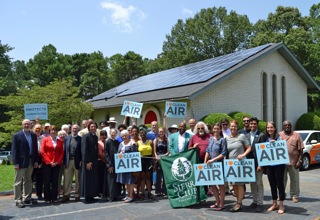On June 18, 2015, Pope Francis released his Encyclical, which addressed the ever-increasing issue our world has to face -- climate change. Within this letter, he beseeches all of mankind to see climate change as a moral issue: it is the poorest, and most vulnerable among us that will suffer the most as the earth continues to change. With his letter, he joins with dozens of other world leaders who are beginning to recognize that these shifts in climate are a serious problem; he, along with these individuals, are paving a more developed path on the way to climate negotiations in Paris later this year.
It is important that we recognize this important step that the Pope, and thus the Catholic church, has taken in its efforts to combat climate change. What is perhaps most profound about the Pope’s message is that he calls all human beings to participate as one to deter these effects; from religious leaders, to scientists, to activists, Pope Francis addresses his letter to all those “of good will”.
And in Georgia last week, in front of a small church called St. Timothy’s, we tried to embody Pope Francis’ ideal. Members of the Church stood alongside environmentalists in solidarity and support of the Encyclical. The purpose of the press conference was not only to reiterate Pope Francis’ message that we need to do all we can and work together to combat climate change, but also to show that regardless of background, ideology, or religion, we can call for a commitment to cleaner air, food, and water from an interfaith perspective.
Almost 50 people attended the event, at which religious leaders, scientists and environmental activists said their piece. Among the speakers were individuals like Reverend Gerald Durley, one of his generation's greatest civil rights activists, connecting climate change to the progression of human dignity; Reverend Daniel Dice, who outfitted St. Timothy’s with solar at no cost in partnership with a local solar business and made the sacred space almost completely self-sufficient; Susan Varlamoff, Director of the University of Georgia's Office of Environmental Sciences, who was tasked by Atlanta's archdiocese to head up a group of Catholics, scientists and others to create a plan to put the pope’s encyclical into action; Rob McDowell, Environmental Policy Program Director; Ian Karra of the Sierra Club; and more.
Karra, in his statement, reiterated the Pope’s message:
“Georgians, regardless of ideology or background, must hold our state leaders accountable for protecting critical clean air safeguards. Our faith partners have long been leaders in the fight for clean energy. With landmark measures like the Clean Power Plan and an updated smog standard to be finalized this year, Georgia's elected leaders and regulators should embrace clean energy as a way to create jobs and protect public health for our state. Hearing that message from the faith, business, scientific, and environmental communities- the groups represented here today- will be essential in shaping Georgia's clean energy future.”
